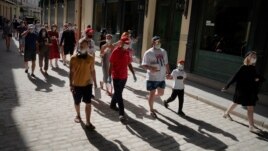13 January 2021
Cuba wants more foreign visitors to come to the Communist country.
The government opened beach resorts in November in an effort to help part of the economy that has been hurt by the spread of the coronavirus.

FILE - Tourists from Russia, staying in a beach resort, walk downtown during a day trip to Havana, Cuba, January 6, 2021. (REUTERS/Alexandre Meneghini)
Francisco Duran of the Ministry of Public Health said recently that around 1,000 visitors were entering Cuba daily. Most of them were going to resorts where COVID-19 policies have been effective. But a small number of visitors were going to the Cuban capital, some after visiting the beach.
Cuba, like other Caribbean countries, depends heavily on foreign visitors, or tourists. Tourism represented about 10 percent of Cuba's economy in 2019. But last year, the economy shrank by 11 percent.
Luis Enrique Gonzalez runs a private eatery in Havana. "A month ago there were no foreign tourists to be seen," he said as a few guests ate at outdoor tables. Now, some Europeans, Canadians and Latin Americans have appeared, but only a few hotels are open.
"Little by little there is more movement and that's a start," Gonzalez said of the capital, which just a year ago had many tourists walking its streets.
Cuba's daily infection numbers remain low in comparison to other nearby countries. Cuban officials say there have been just 148 deaths from COVID-19, the disease caused by the coronavirus.
But the infection numbers have increased sharply over the past month. Flights from the United States and a few other countries were reduced as of the first of the year.
The Communist government reported that about one million tourists visited last year. It wants to increase that by 100 percent in 2021. Still, those numbers are far below the more than four million arrivals in 2019.
Visitors get tests for the coronavirus at the airport and again in five days unless they are staying at a hotel, where they are watched by a medical team. Beginning on January 10, visitors will need to have received a PCR test, a kind of coronavirus test, within 72 hours of their arrival.
Travelers staying at hotels in cities are expected to stay inside until the airport test gives a negative result. If staying in private homes, visitors must remain inside until getting the five-day test's result.
Visitors to some areas can visit the beaches and restaurants as long as they stay away from the local community.
"Who is going to come to Cuba to be shut up in a house," said Norma Hernandez, who rents out rooms in Havana.
Tour guide Carlos Diaz is happy to have some work. He said he was showing 38 German visitors around the old town recently.
"The tourists are coming back bit by bit," he said.
Two British couples said they, like the Germans, had been staying at Varadero beach. They noted the lack of tourists but praised the buildings and sense of safety.
"We will be back when everything is back to normal," Tony Kelly said.
I'm John Russell.
Marc Frank reported on this story for Reuters. John Russell adapted it for Learning English. Mario Ritter, Jr. was the editor.
________________________________________________________________
Words in This Story
resort – n. a place where people go for vacations
quarantine – n. the period of time during which a person or animal that has a disease or that might have a disease is kept away from others to prevent the disease from spreading
negative – adj. not showing the presence of germs or viruses
rent – v. to allow someone to use (something) in return for payment
couple – n. two people who are married or who have a romantic relationship